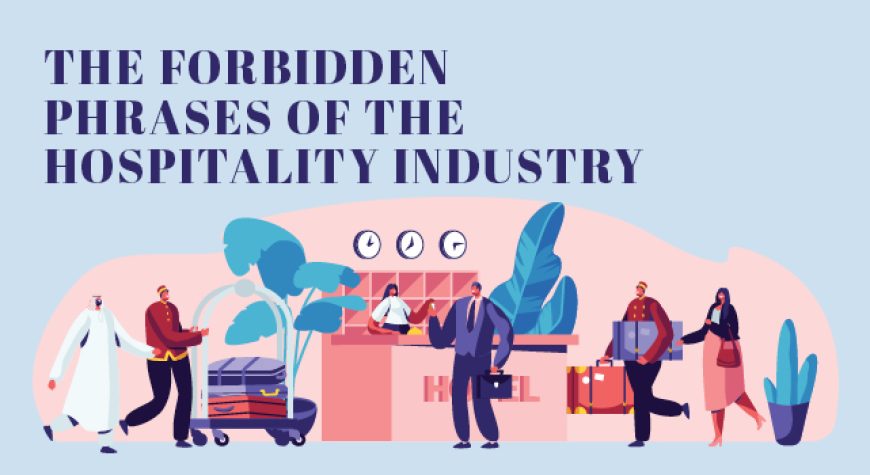
The Forbidden Phrases of the Hospitality Industry
Working on the frontline of customer service has never been an easy task.
It requires mental agility, patience, rapid problem solving, and many others that must be done within seconds of receiving information by customers, which will directly and immediately allow them to make their snapjudgment of your business.
One of the most difficult is working within the hospitality industry since you have mere seconds to think on your feet and convince your customer.
However, even veteran hospitality experts can fall to a spoken blunder when a customer places them in difficult circumstances. Thus in order to handle such situations, there are a number of forbidden phrases that no hotel representative must conjure since they greatly affect closing a deal.
1- “NO” AT THE START OF THE SENTENCE
A “no” has never made a sale, created a loyal customer, nor made a customer journey enjoyable.
It flat out kills whatever emotions the customer has, be them good or neutral.
The best approach is always to listen until the end, take the information accurately and provide positive alternatives that your sales acumen deems able to reach a sale, and satisfy your customer.
Once you master these techniques, and actively work to make your customer’s relationship with your company as smooth as possible, the more that’ll create brand loyalty.
At the end of the day, customers will always remember you for how you solved their problem, and not by looking helpless.
2- I DON’T KNOW
Never ever, EVER, answer a customer’s question with “I don’t know,” they’re asking you for a reason and they expect an answer. Little knowledge of your services or products or lack-there of gives customers the impression that you don’t really care about your job enough to know, which subsequently means that you don’t care about the customer’s needs.
The recommended answer to give to such difficult questions is “Let’s find out” since it provides a more positive out-take to the question, while unconsciously giving the customer a sense of taking part in the sale, making him a little more emotionally invested in knowing. It also provides a definitive answer after doing the research.
Many studies have found that customers enjoy being engaged with the business or brand that they’re dealing with since it justifies their choice in choosing your business instead of another one.
3- WE CAN’T DO THAT
When a customer asks you a question, hoping that you could fulfill their request, try as much as possible to avoid a negative answer or stonewalling them with hard “No” or “Can’t.”
In the mind of the customer, that phrase limits what your establishment can do and they will automatically start thinking of other brands that will be able to fulfill their wishes/requests.
Instead, offer them an alternative such as “here’s what we can do”. The customer will quickly note that you have taken their request to heart while genuinely attempting to give them something close to what they desire. This gives birth to a sense of comfort, not just with the business, but with you as a customer service provider.
4- YOU’LL HAVE TO
The customer is not forced to do anything. Period. This phrase automatically creates a barrier between the customer and the product/service that they are forced to do to get what they want; this also will push the customer to start thinking of other business to go to in order to avoid the barrier you just presented in front of them.
Instead, try using “You’ll need to” since this phrase has a more positive ring to it and sheds off its more aggressive tone. This phrase creates a thought process in the mind of the customer that a necessary obstacle must be undertaken to reach what they want.
5- JUST A SECOND
Whenever these three words are mustered by an employee, the customer will feel like you’re brushing them off for long periods of time. You need to be more specific, honest, genuine, and accurate to the needs of your customer.
That’s why the phrase “Are you able to hold? This may take a few minutes” which provides the customer with a sense of accuracy, extends their patience, and will be convinced that you are dedicatedly working for their best interest, regardless of timing.
